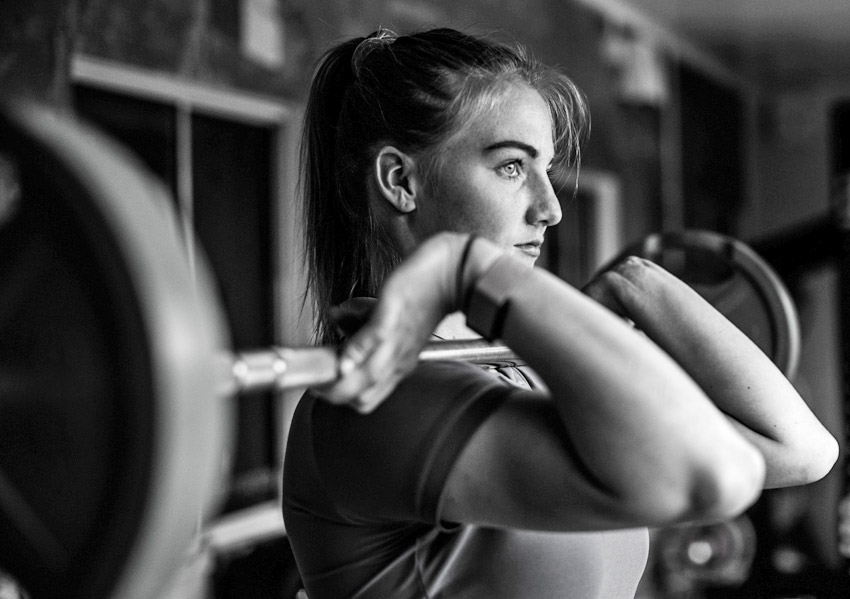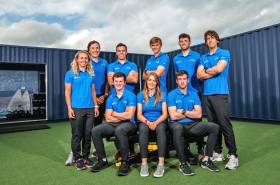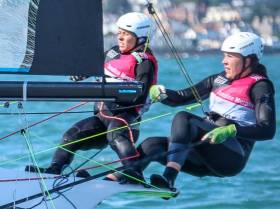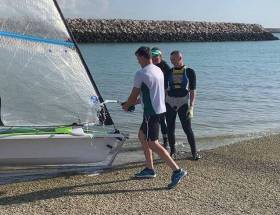Displaying items by tag: Katie Tingle
Annalise Murphy has received a major boost to her 49erFX campaign for Tokyo 2020 as Mercedes-Benz has extended its support to the Olympic silver medallist.
The National Yacht Club hero recently resumed training without direct funding support from Sport Ireland, as her absence from competition due to Volvo Ocean Race commitments ruled her out of the €40,000-per-annum programme.
But now the 29-year-old Rathfarnham sailing star has renewed her ‘Tier One’ partnership arrangement with Mercedes-Benz, availing of a new X-Class pickup to transport her and team-mate Katie Tingle to events here in Ireland and abroad.
“Having the Mercedes-Benz X-Class is a major boost to my training regime and my ambitions for Tokyo,” she says. “I am really looking forward to giving my preparation the X-tra power that the stylish new X-Class delivers.”
Soon to be a regular sight at 49erFX events, the 190hp X-Class is finished in the Kabara black, silver and grey livery similar to that on her previous Mercedes-Benz Vito Mixto van.
Equipped to tow her and Katie’s 49erFX, its features include 4MATIC 4x4 automatic transmission, chrome style bar, bed liner and bed cover in body-matching colour, reversing camera, cruise control power, rear sliding window and a style pack that includes roof rails and side steps.
Wishing Annalise every success on her road to Tokyo, Fergus Conheady, sales manager for Mercedes-Benz commercial vehicles, said: “We are proud to continue our support for Annalise, one of Ireland’s most admired Olympians.”
The renewed support for Annalise Murphy could not come at a better time, as she and Katie prepare for their first big test of their qualifying campaign at the World Cup event in Genoa, Italy next week.
Two of Ireland’s most promising sailors in Aoife Hopkins and Katie Tingle have been the subject of separate profiles in recent days.
Katie Tingle has been making her big comeback after a broken arm put her and Annalise Murphy’s 49erFX training regimen on pause last autumn.
But it’s also been part of a longer return for the Cork sailor, who swapped competitive racing for coaching after success in the Optimist class as a junior last decade.
A reconnection with former junior peer Annalise on the Wednesday night scene in Dublin led to a fateful phone call a year ago, from the Olympic silver medallist to the primary school teacher: did Katie want to join her 49erFX Olympic campaign?
“I don’t think she’d have asked me if she didn’t think I could do it and I wouldn’t have said yes if I didn’t think deep down that I could do it either,” Katie tells The42.ie.
The 29-year-old was already deep into training and conditioning when Annalise returned from her stint in the Volvo Ocean Race, and the two started getting to grips with their new boat on Dublin Bay — the Olympian learning from Katie who had previous experience in two-handed dinghies.
However, a freak incident just weeks into training left Katie with a broken arm — and out of the water for four crucial months.
As needs must, Annalise shortly after resumed training over the winter in the warmer climes of Portugal, with Adam Hyland in Katie’s stead — while Katie hit the gym as soon as doctors allowed get back on the road to sailing fitness.
Earlier this year Annalise and Katie, how fully healed up, reunited and got back in their groove with the challenging 49erFX as their first big test — and first Tokyo 2020 qualifier — looms in Genoa just two weeks from now.
 Aoife Hopkins weight training | Photo: Irish Sailing
Aoife Hopkins weight training | Photo: Irish Sailing
Another young sailor who faces a big test in Genoa is Howth Yacht Club’s Aoife Hopkins.
The Laser Radial ace not only steps into the significant gap left by Annalise Murphy, whose Rio 2016 silver medal was in the class — she’s also in competition with teammate Aisling Keller for the single slot available to Ireland.
Aoife tells The Irish Times how she juggles the training regimen of her Tokyo 2020 campaign with the demands of her maths degree at Trinity College, not to mention the various expenses associated with performance sailing at the highest level.
In a boost to their aspirations, Aoife and her fellow performance sailors now benefit from Irish Sailing's new Performance Headquarters in Dun Laoghaire, as previously reported on Afloat.ie.
Annalise Murphy Back In Training With 49erFX — But Without Sport Ireland Direct Funding
The Irish Times reported earlier this month that Irish Olympic medallist Annalise Murphy no longer has her direct funding support from Sport Ireland.
Performance in competition is a prerequisite for the €40,000-per-annum support under the international carding scheme, also known as the ‘podium’ grand.
However, 29-year-old Annalise moved on from the Laser Radial class after her silver medal win in Rio in 2016.
She spent a number of months in 2017 and 2018 sailing in the Volvo Ocean Race before taking up the 49erFX with a view to qualifying for the Olympics in Tokyo next year.
Annalise recently resumed winter trials with her new boat in Portugal, joined by sailing partner Katie Tingle now recovered from an arm injury sustained last year.
Their first competition as a duo is expected be the Sailing World Cup series regatta in Genoa, Italy this April.
And both will continue to be supported by Irish Sailing, with high performance director James O’Callaghan saying: “The important thing is that [Annalise is] full on campaigning for Tokyo, and we’re delighted to have her back.”
The Irish Times has more on the story HERE.
A Toast For Annalise As Her Winter Training Begins In Cadiz
Mexican Laser sailor Yanic Gentry helped Annalise Murphy christen her new boat on its first day out on the water in Cadiz for winter training yesterday (Thursday 15 November).
The Olympic silver medalist announced earlier this month that she and her 49erFX partner Katie Tingle would be on the move to “somewhere warmer” after spending recent months getting to grips with the class on Dublin Bay — a situation that paused in the autumn due to Katie's arm injury.
While Katie is still on the mend, Annalise could not have have picked anywhere better than the Andalusian coast, near the gateway to the Mediterranean, to make every day count in her campaign to qualify for the 2020 Olympic Games in Tokyo.

































































